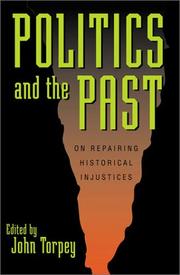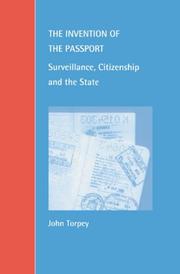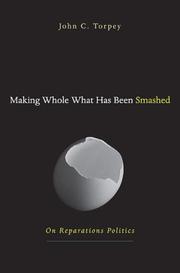| Listing 1 - 10 of 19 | << page >> |
Sort by
|

ISBN: 0742517985 0742517993 9780742517998 Year: 2003 Publisher: Lanham, Md Rowman & Littlefield
Abstract | Keywords | Export | Availability | Bookmark
 Loading...
Loading...Choose an application
- Reference Manager
- EndNote
- RefWorks (Direct export to RefWorks)
Politics --- History as a science --- Intergenerational relations. --- Ethnic relations. --- Restorative justice. --- Relations entre générations --- Relations interethniques --- Justice réparatrice --- Reparations for historical injustices. --- Relations entre générations --- Justice réparatrice --- Ethnic relations --- Intergenerational relations --- Reparations for historical injustices --- Restorative justice --- Balanced and restorative justice --- BARJ (Restorative justice) --- Community justice --- Restorative community justice --- Criminal justice, Administration of --- Reparation (Criminal justice) --- Redress for historical injustices --- Reparation for historical injustices --- Reparations --- Reparations for past injustices --- Restitution for historical injustices --- Indemnity --- Social justice --- Intergenerational relationships --- Relations, Intergenerational --- Relationships, Intergenerational --- Interpersonal relations --- Inter-ethnic relations --- Interethnic relations --- Relations among ethnic groups --- Acculturation --- Assimilation (Sociology) --- Ethnic groups --- Ethnology --- Social problems --- Sociology --- Minorities --- Race relations

ISBN: 0521632498 9780521634939 0521632498 9780521632492 9780511520990 0521634938 0511825269 0511520999 Year: 2000 Publisher: Cambridge Cambridge University press
Abstract | Keywords | Export | Availability | Bookmark
 Loading...
Loading...Choose an application
- Reference Manager
- EndNote
- RefWorks (Direct export to RefWorks)
In order to distinguish between those who may and may not enter or leave, states everywhere have developed extensive systems of identification, central to which is the passport. This innovative book argues that documents such as passports, internal passports and related mechanisms have been crucial in making distinctions between citizens and non-citizens. It examines how the concept of citizenship has been used to delineate rights and penalties regarding property, liberty, taxes and welfare. It focuses on the US and Western Europe, moving from revolutionary France to the Napoleonic era, the American Civil War, the British industrial revolution, pre-World War I Italy, the reign of Germany's Third Reich and beyond. This innovative study combines theory and empirical data in questioning how and why states have established the exclusive right to authorize and regulate the movement of people.
323.2 --- 342.71 --- 342.71 Nationaliteit. Staatsburgerschap --- Nationaliteit. Staatsburgerschap --- 323.2 Burgerbevolking in relatie tot de staat. Burger en staat --- Burgerbevolking in relatie tot de staat. Burger en staat --- Freedom of movement --- Passports --- International law --- International travel regulations --- Safe-conducts --- Movement, Freedom of --- Civil rights --- Domicile --- Emigration and immigration law --- Industrial laws and legislation --- Labor laws and legislation --- Liberty --- Personality (Law) --- Law and legislation --- Passeports --- Libre circulation des personnes --- United States --- Europe [Western ] --- Passports - United States. --- Passports - Europe, Western. --- Freedom of movement - Europe, Western. --- Social Sciences --- Sociology --- Passports - United States --- Freedom of movement - United States --- Passports - Europe, Western --- Freedom of movement - Europe, Western
Book
ISBN: 9780813590547 081359054X 9780813590523 0813590523 9780813590530 0813590531 9780813590516 0813590515 9780813590509 0813590507 Year: 2017 Publisher: New Brunswick, NJ
Abstract | Keywords | Export | Availability | Bookmark
 Loading...
Loading...Choose an application
- Reference Manager
- EndNote
- RefWorks (Direct export to RefWorks)
How should we think about the "shape" of human history since the birth of cities, and where are we headed? Sociologist and historian John Torpey proposes that the "Axial Age" of the first millennium BCE, when some of the world's major religious and intellectual developments first emerged, was only one of three such decisive periods that can be used to directly affect present social problems, from economic inequality to ecological destruction. Torpey's argument advances the idea that there are in fact three "Axial Ages," instead of one original Axial Age and several subsequent, smaller developments. Each of the three ages contributed decisively to how humanity lives, and the difficulties it faces. The earliest, or original, Axial Age was a moral one; the second was material, and revolved around the creation and use of physical objects; and the third is chiefly mental, and focused on the technological. While there are profound risks and challenges, Torpey shows how a worldview that combines the strengths of all three ages has the potential to usher in a period of exceptional human freedom and possibility.
History --- Comparative civilization. --- Civilization --- POLITICAL SCIENCE / Political Freedom & Security / Civil Rights. --- SOCIAL SCIENCE / Future Studies. --- SCIENCE / Philosophy & Social Aspects. --- POLITICAL SCIENCE / History & Theory. --- PHILOSOPHY / Social. --- History, Modern --- Civilization, Comparative --- Barbarism --- Civilisation --- Auxiliary sciences of history --- Culture --- World Decade for Cultural Development, 1988-1997 --- Philosophy. --- Historiography. --- Philosophy --- worldview, human history, humanity, millennium, axis, axial, BCE, BC, AD, human development, history, technology, religion, morality, historical age, axial age, freedom.
Book
ISBN: 1108617514 1108591892 110866427X 1108473903 Year: 2018 Publisher: Cambridge, England : Cambridge University Press,
Abstract | Keywords | Export | Availability | Bookmark
 Loading...
Loading...Choose an application
- Reference Manager
- EndNote
- RefWorks (Direct export to RefWorks)
This book presents the first detailed history of the modern passport and why it became so important for controlling movement in the modern world. It explores the history of passport laws, the parliamentary debates about those laws, and the social responses to their implementation. The author argues that modern nation-states and the international state system have 'monopolized the 'legitimate means of movement',' rendering persons dependent on states' authority to move about - especially, though not exclusively, across international boundaries. This new edition reviews other scholarship, much of which was stimulated by the first edition, addressing the place of identification documents in contemporary life. It also updates the story of passport regulations from the publication of the first edition, which appeared just before the terrorist attacks of 9/11, to the present day.
Passports --- Freedom of movement --- Movement, Freedom of --- Civil rights --- Domicile --- Emigration and immigration law --- Industrial laws and legislation --- Labor laws and legislation --- Liberty --- Personality (Law) --- International law --- International travel regulations --- Safe-conducts --- Law and legislation

ISBN: 1592132421 Publisher: Philadelphia Temple University Press
Abstract | Keywords | Export | Availability | Bookmark
 Loading...
Loading...Choose an application
- Reference Manager
- EndNote
- RefWorks (Direct export to RefWorks)
Book
ISBN: 9781108664271 9781108473903 9781108462945 Year: 2018 Publisher: Cambridge Cambridge University Press
Abstract | Keywords | Export | Availability | Bookmark
 Loading...
Loading...Choose an application
- Reference Manager
- EndNote
- RefWorks (Direct export to RefWorks)
Digital
ISBN: 9780813590547 9780813590516 Year: 2017 Publisher: New Brunswick, N.J. Rutgers University Press
Abstract | Keywords | Export | Availability | Bookmark
 Loading...
Loading...Choose an application
- Reference Manager
- EndNote
- RefWorks (Direct export to RefWorks)
Book
ISBN: 9780674072848 0674072847 Year: 2013 Publisher: Cambridge, Mass. Harvard University Press
Abstract | Keywords | Export | Availability | Bookmark
 Loading...
Loading...Choose an application
- Reference Manager
- EndNote
- RefWorks (Direct export to RefWorks)
Sociology of culture --- Islam --- Human rights --- France --- United States --- Germany --- Canada --- Legal polycentricity --- Islamic law --- Legal polycentricity - Europe --- Legal polycentricity - North America --- Islamic law - Europe --- Islamic law - North America --- Allemagne --- Etats-Unis --- United States of America
Book
ISBN: 2701135362 9782701135366 Year: 2005 Publisher: Paris : Belin,
Abstract | Keywords | Export | Availability | Bookmark
 Loading...
Loading...Choose an application
- Reference Manager
- EndNote
- RefWorks (Direct export to RefWorks)

ISBN: 0674019431 Year: 2006 Publisher: Cambridge (Mass.) : Harvard University Press,
Abstract | Keywords | Export | Availability | Bookmark
 Loading...
Loading...Choose an application
- Reference Manager
- EndNote
- RefWorks (Direct export to RefWorks)
| Listing 1 - 10 of 19 | << page >> |
Sort by
|

 Search
Search Feedback
Feedback About UniCat
About UniCat  Help
Help News
News